#i shall be taking a vow of silence next friday afternoon
Explore tagged Tumblr posts
Text
my mother in the same breath: "I don't understand why you never want to talk to me or hang around with me, anyways I've decided that we'll [thing I've repeatedly told her is harmful to my wellbeing]"
#i shall be taking a vow of silence next friday afternoon#occasions where having bitch resting face comes in handy#text:null
3 notes
·
View notes
Photo
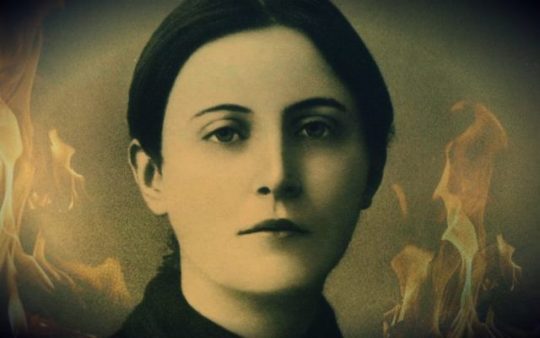
Saint of the Day – 11 April – St Gemma Galgani (1878-1903) known as The Flower of Lucca, The Virgin of Lucca and Daughter of the Passion – Stigmatist & Mystic – born on 12 March 1878 at Borgo Nuovo di Camigliano, Lucca, Tuscany, Italy and died on Holy Saturday, 11 April 1903 at Borgo Nuovo di Camigliano, Lucca, Italy of tuberculosis. Her relics interred in the Passionist monastery, Lucca. Patronages – Students, Pharmacists, Paratroopers and Parachutists, loss of parents, those suffering back injury or back pain, those suffering with headaches/migraines, those struggling with temptations to impurity and those seeking purity of heart. Attributes – Passionist robe, flowers (lilies and roses), guardian angel, stigmata, heavenward gaze.
Gemma Galgani was born on 12 March 1878, in a small Italian town near Lucca. Gemma is the Italian word for gem. The child’s mother was worried that this name was not a saint’s name but a priest friend comforted her with the remark that perhaps the child would one day be a “gem of Paradise.”
At a very young age, Gemma developed a love for prayer. She credited her mother, who died when Gemma was very young, with inspiring in her the desire for Heaven and with teaching her about God. Gemma made her First Communion on 17 June 1887. Later, she wrote, “It is impossible for me to describe what passed between Jesus and myself in that moment. He made himself felt so strongly in my soul. I realised in that moment how the delights of Heaven are not like those of the earth and I was seized by a desire to make that union with my God everlasting.”
As a day pupil at the school run by the Sisters of St Zita, Gemma was loved by her teachers and her fellow pupils. Although quiet and reserved, she always had a friendly smile for everyone. Though by nature a bright and lively child, she exercised great self discipline even as a schoolgirl, keeping her feelings under control. The superior of the sisters at the school once asked Gemma’s teacher and her class to pray for a dying man who refused the Sacraments. After the prayer, Gemma arose from her seat and going up to her teacher, whispered in her ear, “The grace is granted.” That evening the news as brought that the man had indeed converted and received the consolations of the Faith before his death.
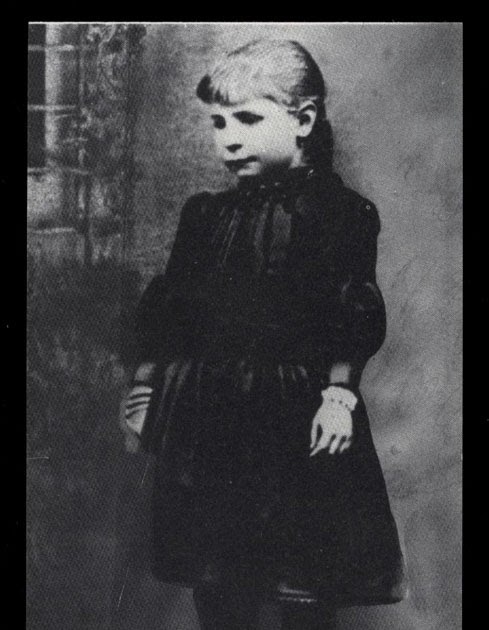
Throughout her life, Gemma was to be favoured with many mystical experiences and special graces. Often these were misunderstood by others, bringing ridicule. A sensitive person, Gemma suffered these heartaches, too, in reparation, remembering that Our Lord Himself had been misunderstood and ridiculed.
Although she was a good student, Gemma had to quit school due to chronic ill heath before completing the course of study. Throughout her life, her frail constitution did not stand up well to several illnesses.
Gemma’s father had been a moderately successful pharmacist. But because of his generosity and his willingness to extend credit to those in need, he began to get into financial trouble. His death in 1897 left Gemma and his other children penniless orphans. Gemma felt the loss of her father keenly but did not appear to be bothered by the poverty of her circumstances. She must have felt desolate when the creditors came and took away the few possessions left to the family on the very day of her father’s funeral but she maintained her cheerful, patient attitude.
Gemma had an immense love for the poor and when she went out, many poor people came to her for help. When she could, she gave them things from home. Later, when she too was a “povera,” or poor girl, she gave them the gift of friendship. She would weep over their misfortunes, completely ignoring her own.
After her father’s death, the nineteen-year-old Gemma became the mother of her seven brothers and sisters. When some were old enough to share this responsibility, she lived briefly with a married aunt. Although she returned the love given by this aunt and uncle, Gemma was unhappy with the busy social life of the couple. They were well off and wanted Gemma to join in the fun which they could afford to provide. At this time, two young men proposed marriage to her. Gemma, however, wanted silence and retirement and more than ever she desired to pray and speak only to God.
Gemma returned home and almost immediately became very ill with meningitis. Gradually she lost her hearing and some of her hair. In addition, she suffered a complete paralysis of her limbs. All earthly remedies proved vain and Gemma was confined to bed for more than a year. Throughout this illness, her one regret was the trouble she caused her relatives in taking care of her. News of the heroic patience of the gentle girl spread about the town and many visitors came to cheer her up. For each visitor, Gemma had a smile and a welcoming comment.
Feeling herself tempted by the devil, she prayed for help to the Venerable Passionist, Gabriel Possenti. (Gabriel was later canonised.) He appeared to her in dreams several times, promising her help and calling her “sister.” Through his intercession, Gemma was miraculously cured. In one of her visions of Gabriel, he placed the badge of the Passionists on Gemma. When she spoke of her desire to enter a convent, he told her to make her vow to be a religious but not to add anything to this vow. Gabriel was telling her that although she might live the life of a nun, she would never enter any particular convent. Later, Gemma was rejected as a candidate for the religious life on the grounds of her health was too delicate. She offered this disappointment to God as a sacrifice.
Gifted with an ability for prophecy, Gemma predicted that the Passionists would establish a monastery at Lucca; this came to pass two years after her death. When she understood that she would not be able to enter a Passionist monastery, Gemma said, “The Passionists did not wish to receive me; nevertheless, because I wish to stay with them, I shall when I am dead.” Today, Gemma’s mortal remains are still treasured at the Passionist monastery in Lucca.
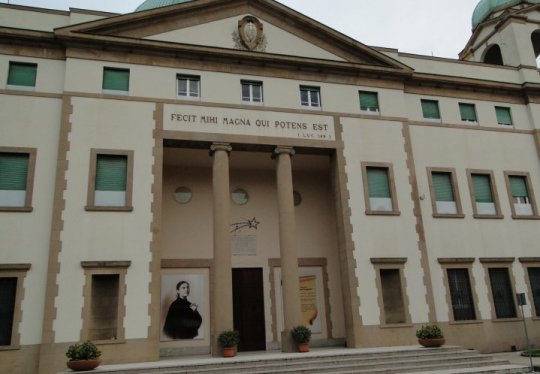

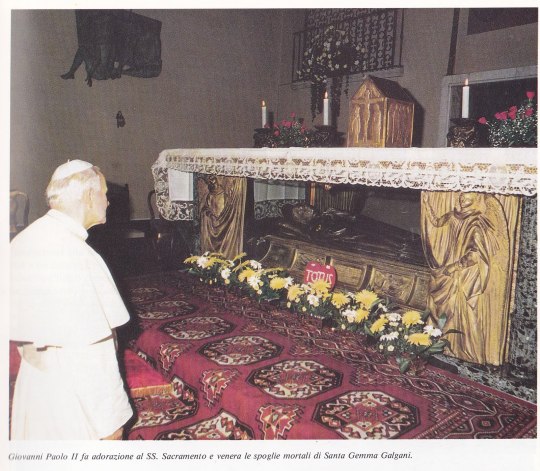
On the 8 June, 1899, Gemma had an interior warning that some unusual grace was to be granted to her. She spoke of this to her confessor and received absolution. She later gave the following account to her spiritual director: “It was Thursday evening, and suddenly I felt an inward sorrow for my sins; but so intense that I have never felt the like again; my sorrow made me feel as if I should die then and there. After that I felt all the powers of my soul in recollection. My intellect seemed to know nothing but my sins and how they offended God . . . Then thoughts crowded thickly within me and they were thoughts of sorrow, love, fear, hope and comfort.”
In rapture, she saw her heavenly Mother, who wrapped Gemma in her mantle. At that moment, according to her own account, “Jesus appeared with His wounds all open; blood was not flowing from them but flames of fire which in one moment came and touched my hands, feet and heart. I felt I was dying and should have fallen down but for my Mother who supported me and kept me under her cloak. Thus I remained for several hours. Then my Mother kissed my forehead, the vision disappeared and I found myself on my knees; but I had still a keen pain in my hands, feet and heart. I got up to get into bed and I saw that blood was coming from the places where I had the pain. I covered them as well as I could and then, helped by my Guardian Angel, got into bed.”
The next day, covering her hands with gloves, Gemma attended Mass as usual. Later, she showed the marks of the stigmata to one of her aunts, saying, “Just look at what Jesus has done to me!”
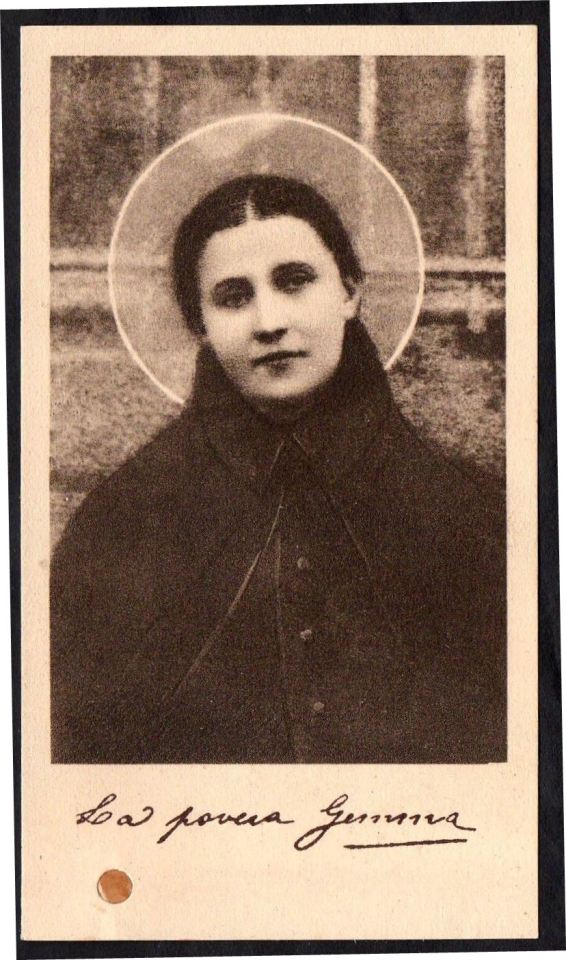
Each Thursday evening, Gemma would fall into rapture and the marks would appear. The stigmata remained until Friday afternoon or Saturday morning when the bleeding would stop, the wounds would close and only white marks would remain in place of the deep gashes. Later, one of Gemma’s directors turned to science and had a doctor examine the stigmata. As Gemma had foreseen, the doctor considered them a manifestation of some form of disease, or the delusions of an overly pious soul. Gemma’s stigmata continued to appear until the last three years before her death. At this time, her director forbade her to accept this phenomenon and through her prayers it ceased, although whitish marks remained on her skin until her death.
Through the help of her confessor, Gemma went to live with a family named Giannini, where she was allowed more freedom than at home for her spiritual life. She was very grateful to this adoptive family and was more than once overheard in ecstasy praying for its members. In this home, Gemma cheerfully did housework and helped in the training and education of the children.
There is a good record of Gemma’s words during ecstasy. In this state of rapture, the soul is so absorbed in God that the normal activity of the senses is suspended. Both her confessor and a relative of the head of her adoptive family, Aunt Cecilia, often overheard Gemma and recorded her conversations.
Father Germano once overheard her arguing with Divine Justice for the salvation of a soul. Some of her words were: “I do not seek Your justice, but for Your mercy. I know, he made You shed tears; but . . . You must not think of his sins; You must think of the Blood You shed. And now answer, Jesus and tell me You have saved my sinner.” Gemma actually named the man she was praying for. Soon afterwards, she broke out joyfully, “He is saved! You have won, Jesus; triumph always thus.” Then she came out of ecstasy.
Father Germano had just left the room when he heard a knock and was told that a stranger wished to speak to him. As soon as the man was before the priest, he fell to his knees weeping and said, “Father, I want to make my confession.” The priest was stunned to realise that it was Gemma’s sinner.
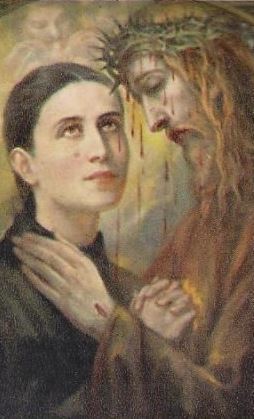
Gemma often saw her guardian angel, with whom she was on familiar terms. Sometimes the angel protected and consoled her, sometimes he counselled her and occasionally he scolded her very severely for her faults. He would say, “I am ashamed of you.” At times Gemma was heard arguing with her guardian angel, so that her spiritual director, Father Germano, had to remind her that she was speaking with a blessed spirit of Heaven and should be very respectful. The angel is mentioned on almost every single page of Gemma’s diary. In one entry, Gemma wrote that the devil had been raining down blows on her shoulder for nearly half an hour. “Then my guardian angel came and asked me what was the matter; I begged him to stay with me all night and he said: ‘But I must sleep.’ ‘No,’ I replied, ‘the Angels of Jesus do not sleep!’ ‘Nevertheless,’ he rejoined, smiling, ‘I ought to rest. Where shall you put me?’ I begged him to remain n ear me. I went to bed; after that he seemed to spread his wings and come over my head. In the morning he was still there.”
One of the most extraordinary things is the fact that Gemma often sent her guardian angel on errands, usually to deliver a letter or oral message to Father Germano in Rome. Often the reply was delivered by the priest’s guardian angel. Realising how unusual this was, Father Germano asked Heaven for a sign that it was in accord with God’s Will. After Gemma’s death, he wrote: “To how many tests didn’t I submit this singular phenomenon in order to convince myself that it took place through a supernatural intervention! And yet none of my tests ever failed; and thus I was convinced again and again that in this, like in many other extraordinary things in her life, Heaven was delighted in amusing itself, as it were, with this innocent and dear maiden.”
During the apostolic investigations into her life, all witnesses testified that there was no artfulness in Gemma’s manner. At the end of each of her ecstasies, she returned to normal and went quietly and serenely about the family life. Most of her severe penances and sacrifices were hidden from most who knew her. Only a few around her privileged to realise that she was exceptionally favoured.
In spite of everything which had happened to her, Gemma understood the true joy of her way of life. She said, “There is neither cross nor sorrow, when we are tightly united to Jesus.”
In January of 1903, Gemma was diagnosed as having tuberculosis. To avoid danger to her adoptive family, she was isolated in a small apartment close to the Giannini house. For four months Gemma suffered uncomplainingly from the disease. She died quietly, in the company of the parish priest, on 11 April. In his testimony he said, “I have been present at many deathbeds but never have I seen anyone die like Gemma, without even a precursor sign, nor a tear, nor a panting breath. She died with a smile which remained upon her lips, so that I could not convince myself that she was really dead.”
The Church authorities began to study Gemma’s life in 1917 and she was beatified in 1933. The decree approving the miracles for canonisation was read 26 March 1939—Passion Sunday. Gemma was canonised on 2 May 1940, only thirty-seven years after her death.

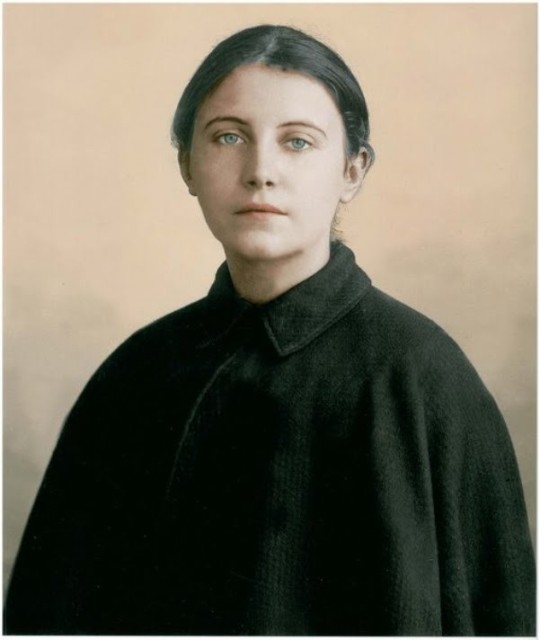
(via AnaStpaul – Breathing Catholic)
92 notes
·
View notes